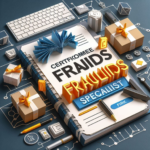In today's digital era, where online shopping has become an integral part of our lives, ensuring the security of eCommerce transactions is of paramount importance. As technology evolves, so do the tactics of cybercriminals aiming to exploit vulnerabilities in the digital landscape. To counter these threats, the role of Certified e-commerce Fraud Specialists has emerged as a crucial line of defence in safeguarding online transactions and protecting consumers and businesses alike.
What is eCommerce Fraud
eCommerce frauds refers to any deceptive or illegal activity targeting online transactions. Cybercriminals employ various tactics to exploit weaknesses in the eCommerce system, ranging from stolen credit card information to sophisticated phishing schemes. As online shopping continues to grow, so does the need for experts who can stay one step ahead of these fraudulent activities.
Common Types of eCommerce Frauds
There are many examples of consumer complaints about the e-commerce frauds. Analysis of these complaints can be classified into 5 primary categories viz. Payment, Shipping, Financial Statement, Inventory and Coupon frauds. Common types of e-commerce frauds encompass a wide range of deceptive practices aimed at exploiting vulnerabilities in online transactions.
Payment Fraud
Payment fraud involves unauthorized transactions using stolen credit card information. Fraudsters may use stolen card details to make purchases online, leading to financial loss for both the cardholder and the merchant.
Account Takeover fraud: Account takeover occurs when a fraudster gains unauthorized access to a customer's account by stealing login credentials. Once access is gained, the fraudster can make unauthorized purchases or change account information.
Identity Theft: Identity theft involves using stolen personal information, such as a name, address, or Social Security number, to open fraudulent accounts or make purchases. Victims of identity theft can suffer significant financial and reputational damage.
Phishing: Phishing is a fraudulent attempt to obtain sensitive information, such as usernames, passwords, and credit card details, by disguising it as a trustworthy entity in an email or text message. Once obtained, this information can be used for various types of fraud.
Friendly Fraud: Friendly fraud occurs when a customer makes a purchase online and then disputes the charge with their credit card issuer, claiming that they did not authorize the transaction. This type of fraud can result in chargebacks for the merchant.
Triangulation Fraud: Triangulation fraud involves a fraudster setting up a fake online store to collect payment information from customers. The fraudster then uses this information to make purchases from legitimate online retailers, leaving the victims to deal with the fallout.
Shipping Fraud
Shipping fraud occurs when a fraudster uses stolen credit card information to make a purchase online and then reroutes the shipment to a different address. The legitimate cardholder is unaware of the purchase until they receive a notification from the merchant or their credit card issuer.
Affiliate Fraud
Affiliates use deceptive tactics to earn commissions. This can include fake leads, clicks, or sales, leading to financial losses for merchants. Detecting and preventing affiliate fraud is crucial for maintaining a fair and profitable affiliate program. Affiliates use multiple websites or redirects to conceal the true source of traffic, making it difficult to track the origin of referrals, this technique is sometimes also referred to as Traffic Laundering.
Coupon Fraud
Coupon fraud in the e-commerce sector involves the deceptive use of coupons to obtain discounts or benefits that the user is not entitled to. This fraud can take various forms, such as using counterfeit coupons that are not issued by the legitimate issuer or using legitimate coupons in an unauthorized or fraudulent manner. Fraudsters may exploit loopholes in coupon terms and conditions, such as using a coupon multiple times or for products that are not eligible for the discount. These actions not only result in financial losses for the e-commerce companies but also undermine the trust of consumers and the integrity of couponing systems.
Inventory Fraud
Inventory fraud occurs when individuals manipulate inventory records to steal products or misrepresent the value of inventory. This type of fraud can take various forms, such as falsely inflating inventory levels, misappropriating inventory for personal use, or concealing inventory shrinkage. By manipulating inventory records, fraudsters can create the illusion of adequate stock levels or undervalued inventory, which can lead to financial losses for the business and inaccurate financial reporting. Inventory fraud not only impacts the financial health of a company but can also erode trust with customers, suppliers, and investors.
Financial Statement Fraud
Financial statement fraud in the e-commerce sector involves deceptive practices aimed at misrepresenting the financial health and performance of an online business. Common tactics include inflating revenues, understating expenses, and manipulating asset values. For instance, an e-commerce company might falsely report higher sales figures by recording fictitious transactions or recognizing revenue before goods are delivered or services rendered. Similarly, expenses might be understated by delaying recognition or improperly capitalizing costs. Such fraudulent practices can create the illusion of profitability and financial stability, deceiving investors, creditors, and other stakeholders.
Additionally, e-commerce businesses may manipulate their financial statements to conceal liabilities, overstate the value of assets, or make misleading disclosures. For example, an online retailer might overstate the value of its inventory to inflate its financial position or fail to disclose contingent liabilities to avoid alarming investors. These fraudulent activities can have serious consequences, including regulatory investigations, legal action, and damage to the company's reputation. In some cases the companies are listed the financial statements are also restated. Implementing robust internal controls, conducting regular audits, and promoting a culture of transparency and ethical behaviour are essential to prevent and detect financial statement fraud in the e-commerce sector.
Certified eCommerce Fraud Specialist


 Riskpro has created a special book called "eCommerce Frauds: Navigating the Shadows of Online Business." This book is important for people who want to learn about online fraud. It has detailed information and practice questions that can help you prepare for exams related to online fraud. Becoming a certified eCommerce Fraud Specialist shows that you know a lot about this area, which can build trust with businesses and customers. In today's digital economy, trust in online shopping is crucial, and having certified experts can make online transactions safer. You can buy this
Riskpro has created a special book called "eCommerce Frauds: Navigating the Shadows of Online Business." This book is important for people who want to learn about online fraud. It has detailed information and practice questions that can help you prepare for exams related to online fraud. Becoming a certified eCommerce Fraud Specialist shows that you know a lot about this area, which can build trust with businesses and customers. In today's digital economy, trust in online shopping is crucial, and having certified experts can make online transactions safer. You can buy this 
Balasubramaniam (verified owner) –
The course is very neatly designed. It gives the understanding of different techniques of the eCommerce frauds to the aspirants of the certification. I was impressed by this course when i could complete the examination swiftly and during the process i was not required to contact any staff of Indiaforensic. I received my certification immediately. The best part is I scored better than the average score of the examination takers.
Ashok c (verified owner) –
I was very conservative while joining this certification as i have some good and some bad experiences about the e-learning courses. But this program exceeded my expectations. It is probably one of the few best certifications in eCommerce frauds domain, if not the only one.
Rajiv Shekhar –
A really excellent course – informative and insightful. I recommend this course for anyone working in eCommerce domain, whether a new practitioner or experienced. This course gives some really good ideas about prevention of the eCommerce frauds. It personally helped me to come out with solutions after listening to some of the innovative techniques of the eCommerce frauds.